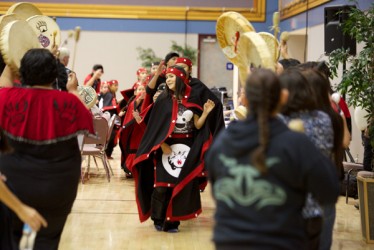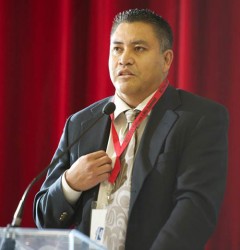Article Origin
Volume
Issue
Year
First Nations need to step up to be involved in the decision-making process regarding resource development in B.C.
“We’re in the game, whether we like it or not,” said Carrier Sekani Tribal Council Chief Terry Teegee. “The quicker we deal with each other and build our relationships, the better off we are.”
First Nations, along with federal Environment Minister Joe Oliver, provincial government representatives, industry representatives and Japanese Ambassador Norihiro Okuda, gathered Oct. 9 and Oct. 10 at a summit to discuss liquefied natural gas development. About 300 people were in attendance.
But prior to the main event, First Nations were invited to attend a pre-conference workshop hosted by the First Nations Financial Management Board.
Teegee said the focus of the pre-conference was to see how First Nations with shared territories are able to get beyond their differences and work together toward mutual benefits. Whether through memorandums of understanding or friendship treaties, building communication and developing trust are paramount if First Nations want to tackle ever-encroaching development from a position of strength.
“Once we realize that we can work together, not only politically, but technically, it provides a lot of leverage when we’re dealing with either the government or these proponents rather than getting picked off one by one,” said Teegee. “If we’re all together we can do the best deal possible.”
While the two-day summit focused on LNG developments, Teegee said other development, such as forestry, mining and pipelines, was also discussed.
“The whole issue of development and how it affects our territories, the cumulative impacts of all this industry development…it’s a big issue,” he said.
Teegee said another issue First Nations face on a regular basis is the wooing of their support by project proponents.
“We’ve been dealing with five pipeline proposals but there are more out there. We’ve just been inundated with a lot of information. These companies want to fast track the process, to get their projects going and to demonstrate to their purchasers that it’s a feasible project to get these long term contracts. We’re forced to do all these studies on how these projects are going to affect our people, but we’re very ill-prepared and we don’t have the capacity to get the right answers,” he said.
The costs for the studies are being borne by the companies themselves, who provide tribal councils or the First Nations with capacity funding to support their own teams of lawyers and advisors to critically examine the proposed projects.
Dealing with the proponents, said Teegee, is a pressure First Nations shouldn’t be feeling.
“Essentially for us, as First Nations, we should be dealing with the governments first … really considering if we want these projects in the first place,” he said.
Assembly of First Nations BC Regional Chief Jody Wilson Raybould, who was in attendance, agreed.
“First Nations are grappling with and seeking to address in a meaningful way with the provincial and federal governments in terms of a more comprehensive approach to resource development. And are we speaking with the proper title holders, those that can make decisions about resource development and impact on traditional territories? And it lends itself to the reality and the fundamental need to comprehensively address the land question in British Columbia and to support First Nations rebuilding their appropriate systems of governance beyond the Indian Act.”
The summit resulted in a declaration to work together and the development of an action plan.
“We’re not, as has been said, opposed to development, but not at any cost. So what we’re seeking to do is to find a balance between economic development and assuring for future generations that our lands are protected and sustained,” said Raybould.
A final report from the summit is forthcoming.
- 3711 views


